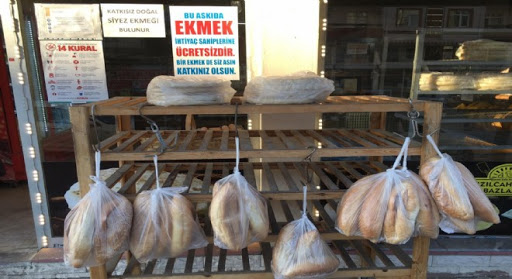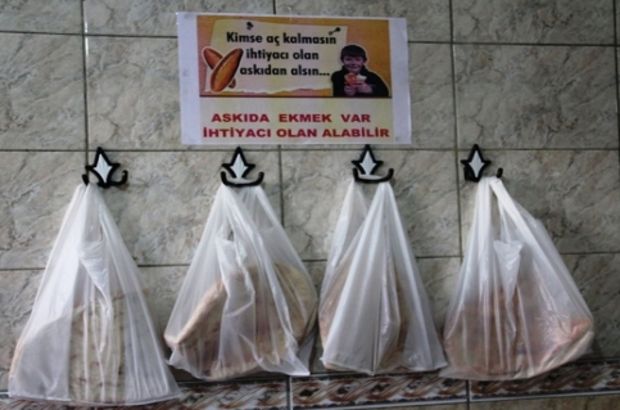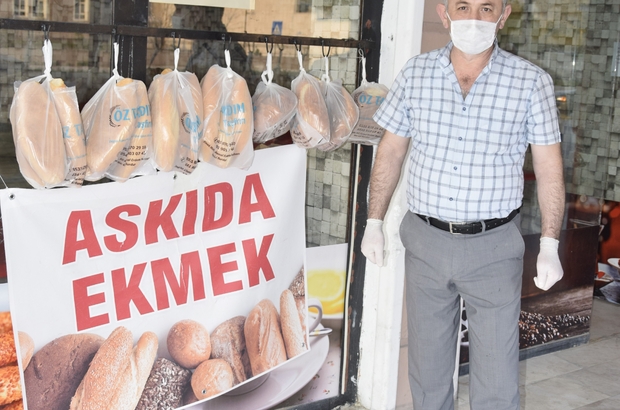
- Better Society -
- 5mins -
- 1,770 views
Askıda Ekmek: Turkey’s ancient tradition of ‘paying it forward’
In Turkey, the seemingly modern idea of paying it forward goes back centuries. It’s called askıda ekmek and should be adopted across the globe to help the less fortunate
Hanging bread in Turkey is helping the less fortunate
In Turkey, there’s an ancient tradition called Askıda Ekmek, and works like this: you go to a baker, buy a loaf of bread and pay for two. On paying for the bread, you say “And one askida ekmek”. Your contribution is bagged and hung on a hook together with others. When people come in throughout the day and ask, “Is there bread on the hook?”, they can take a loaf for free.

It’s unclear when and how the practice of askıda ekmek started
In many Western countries, it has become common in recent years for people to hand over money for an extra cup of coffee or a filling meal when they pay for their own, to be held at the counter for a person in need. In Turkey, this seemingly modern idea of “paying it forward” goes back centuries. It’s called askıda ekmek, and it relates specifically to paying it forward with bread.
Askıda ekmek, which means “bread on a hanger” or “suspended bread”, has its roots in Islam, the dominant religion in the country. It works like this: you go to a bakery and pay for two loaves of bread but only take one. On paying for the bread, you tell the person who takes the money that one of them is askıda ekmek. Your contribution is bagged and hung together with others so when people come in throughout the day and ask, “Askıda ekmek var mi?” (“Is there bread on the hook?”), they can take a loaf for free.
It’s not clear exactly when and how the practice of askıda ekmek started. Although there are similar, more recent traditions in other countries, like the Italian practice of “caffè sospeso” (“suspended coffee”), askıda ekmekis is strongly tied to the local culture and religion.
Source: BBC

Some Turks kiss bread to demonstrate their respect
The giving of ekmek (bread) is of special importance in Turkey because in Islamic belief, bread sustains life and the protection of life is sacred.
In Muslim hadiths, the collected sayings of the Prophet Muhammed, bread is nimet, a blessing sent from God. If a piece of bread accidentally falls to the ground it must be picked up immediately before placing it somewhere higher. Some people kiss it before doing so to further demonstrate their respect.
Plain white bread is baked twice a day in Turkey and every meal is accompanied by a basket full of sliced fresh loaf. Leftovers are never thrown away; when bread goes stale, it’s made into French toast and breadcrumbs. Visitors will often see plastic bags containing old bread hanging off fences along streets, placed there for people to take either for themselves or to feed animals.
Source: BBC

Keeping with the times, Askıda ekmek has even gone online
Askıda ekmek has gone online, too, with yemek.com, a popular Turkish website featuring daily recipes, asking readers to nominate neighbourhood shops promoting askıda ekmek. Their aim is to transform it from a local neighbourhood activity into a national resource listing participating bakeries, using the call to action, “Let us help people who live on the streets who cannot afford bread”.
One man has taken these technological advancements a step further. In 2012, Oğuzhan Canım read about bakeries in Kırıkkale, 80km east of Ankara, promoting the practice of askıda ekmek so more bakeries would participate. It made him think about ways to scale the custom in order to reach more people. Canım knew there was limited government aid for university students in Turkey and that there weren’t enough bursaries, scholarships and food grants to go around.
His solution is a social enterprise called Askidanevar (What’s on the Hook?), the first in Turkey to combine the concept of askıda ekmek with the reach of social media platforms. The idea may be innovative, but the aim is very simple: to connect university students in need to the companies that want to support them.
“Oğuzhan Canım, the founder … changed the practice [to] askıda yemek (food) and created the project. With the help of [the] internet, he decided to make this project bigger so that it works effectively, [and] reaches as many as possible. We aim to create more opportunities … using our power to reach youth,” said operations manager Görkem Özaçık.
Askidanevar targets students because Canım believes they’re the future of Turkey. He wants young people to have the opportunity to read poetry, engage in the arts and pursue goodness, and become complete, well-rounded individuals. This way, he believes, they’ll not only succeed in their studies, they’ll also pay it forward and contribute more to Turkish society and the world, through a culture of sharing.
Source: BBC

This holistic approach isn’t unusual in predominantly Muslim societies
The community or group takes precedence over the individual and the well-being of all is paramount. It’s normal in Turkey for individuals to look out for others, be it family, neighbours, colleagues or even strangers, in the belief this improves things for everyone.
At the heart of askıda ekmek – whether that’s leaving a loaf in a bakery or helping students access opportunities outside their studies – is an ethos of helping people, with no expectation of reward or recognition so that recipients maintain their dignity and improve their lives.
In a world divided by the pursuit of individual profit and torn apart by conflict, we think that’s amazing.
Source: BBC

